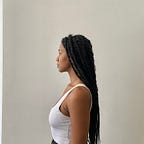Fleshing Out the Work of Black Women During the Civil Rights Era
What black liberation movies fail to show you
Note: the following piece includes spoilers of the film Judas and the Black Messiah
The other evening I watched the Academy nominated film Judas and the Black Messiah (dir. Shaka King).
It is a historical film narrating Fred Hampton’s time as chairman of the Black Panther chapter in Illinois and his eventual demise at the hands of party member and FBI informant William O’Neal. It was good and I believe deserving of the nominations; the visuals were on point, and the story lined flowed.
But I was still unsatisfied. I have been unsatisfied.
Hollywood’s attempt to capture to civil rights movement and highlight the black experience has been done time and time again through a patriarchal and monolithic lens. Although meant to be a portrayal, civil rights films are almost always about black men. They’re shown in all their glory, surrounded by other men and supported by their wives who start to shake under the pressure of the revolution.
This was the case in King’s recent film when Akua Njeri (FKA Deborah Johnson) articulates concerns over their unborn baby’s fate at the peak of the tension between the party and government officials. The 2014 movie Selma portrays a similar narrative when depicting disputes between Dr. Martin Luther King and Coretta Scott.
It’s ironic how we have been haunted by the strong black women trope, and yet people seem to drop that belief when it comes to the black liberation movement. Then we’re belittled to the black man’s shadows.
Men have always been considered the main agents of change in the black liberation movement.
In reality, women made up two-thirds of the Black Panther Party membership around this time.
Furthermore, the Illinois chapter integrated progressive gender dynamics. Women held leadership positions within all aspects of the party, from finances to security.
Former party members of the Illinois chapter shared that Fred Hampton encouraged women to take up space and greater responsibility. He also addressed issues of sexism and abusive behaviour within the chapter. Incidents were not swept under the rug and any men engaged in inappropriate behaviour were confronted.
The film does depict black women such as Judy Harmon, who lead the security team, yet her portrayal can almost be regarded as token representation. She is always seen in male dominated spaces.
Although much of their work goes unnoticed, black women played an indispensable role in running the social programs the party set up and the Black Panther Party publications. They also proved higher levels of competence. An internal survey within the Black Panther Party conducted in 1973 revealed there were higher rates of college attendance among women party members.
Was the party perfect in establishing equality? No.
There was little effort to help members who were both active participants but also mothers. Women were expected to contribute to the party and tend to their role of caretakers and towards the disbandment of the party, many left for this very reason.
Black women do twice the work yet receive half the praise that men do. And although they take on more responsibility they are considered less competent.
This is because men have always been considered the main agents of change in the black liberation movement.
There is a refusal to move away from the hypermasculine narrative that the civil rights movement was pioneered solely by men. Thus their work is continuously romanticized while that of black women are ignored.
In truth, black women have contributed just as much, if not more. I would go even further to state that their contributions are twice as potent as that of black men. This is not to discredit the work of any of those mentioned above. But black women’s plight is intersectional; we experience racism as black folks, sexism as women, and both simultaneously.
Angela Davis, bell hooks, Assata Shakur, Shirley Chisholm and many others fought to have their voices heard during the civil rights movement, speaking loud over men and white women who could not fathom the unique structural barriers we faced.
Many fought hard to keep black women from leading in the civil rights era and feminism movements, but despite resistance, they shattered that glass ceiling.
Furthermore, black women activists have pushed racial equality and feminist movements towards radicalization and away from reformative politics. This is because reform policies could never respond to our needs.
Although the speeches of Dr. King, Mohammed Ali and Malcolm X are well known and documented, there has not been half the effort to highlight the words of black women who pioneered the civil rights movement as well.
Yet not only did they lead, but many also provided literary works which served as tools relevant until today that explain in detail the scope of these injustices and precisely how to combat them.
“The most disrespected person in America is the black woman”. And when will she be given the respect owed? When will we see a black woman on the big screen leading protesters? When will someone decide to shed light on the work of black women behind the scenes and upfront, that has been indispensable for the movement’s progression?
sources:
Jakobi Williams. “Don’t no woman have to do nothing she don’t want to do”: Gender, Activism, and the Illinois Black Panther Party https://www.jstor.org/stable/10.5406/blacwomegendfami.6.2.0029?seq=1
Tracye A. Matthews. “No One Ever Asks What a Man’s Role in the Revolution Is” Gender Politics and Leadership in the Black Panther Party, 1966–71
Angela Davis. “Women, Culture & Politics”
